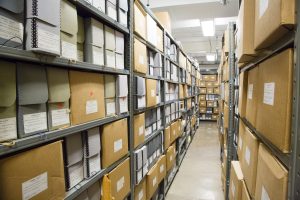On March 14, the White House issued an Executive Order calling for the elimination of the non-statutory components and functions of seven agencies, including the Institute of Museum and Library Services (IMLS); later actions put all staff at the agency on administrative leave. Discontinuation of all funding from IMLS appears imminent, and many grants have already been canceled, including grants to the University of Illinois Urbana-Champaign Library. The White House also terminated more than 1,000 grants from the National Endowment for the Humanities (NEH) and indicated it intends to significantly reduce the agency’s staffing. The Library has received notification that its two grants from NEH have been canceled.
These developments mark a significant time for the University of Illinois Urbana-Champaign and institutions nationwide. The loss of support from IMLS and NEH jeopardizes decades of sustained investment in cultural preservation, scholarly communication, and academic research.
“Funding from the National Endowment for the Humanities and the Institute of Museum and Library Services has been important in extending the life of, and access to, the renowned collections we hold at the University of Illinois. These grants have also advanced critical domain research and developed the faculty and staff whose expertise enhances the success of our students and faculty. Although most IMLS and NEH grants are modest compared to the large grants from federal science agencies, the matching funds we have been able to attract thanks to this federal support have significantly extended our reach, helping to meet students and scholars where they are, across our state and around the world,” said Juanita J. and Robert E. Simpson Dean of Libraries and University Librarian Claire Stewart. “We feel it’s important to share this information with those who utilize our Library. Eliminating this funding will endanger vital advances in research and service innovation for years to come.”
National Endowment for the Humanities
Since 1966, the NEH has provided over 40 grants to the Library, totaling more than $20M in direct support. These include:
- Preservation microfilming of non-English language materials, newspapers, musical scores, and other materials
- Processing of archival materials such as the Carl Sandburg Papers
- Planning for cooperative preservation programs
- Development of an endowment for ongoing support of cataloging, preservation, and access projects
- HVAC improvements for archival storage and preservation
- Newspaper cataloging, microfilming, and digitization
- Digitization of emblem book collections
- Application of machine learning to archival materials
The termination of NEH grant funding directly affects two current Library projects: the Illinois Digital Newspaper Project and “No Longer at the Margins: A Digital Project to Amplify Access to the Archives of Women in Science.”
Since 1989, the Illinois Digital Newspaper Project and its predecessor projects in the Library have been awarded more than $5.6M in grant funding from NEH. These funds have supported the cataloging of thousands of Illinois newspaper titles, the microfilming of selected publications, and the digitization of nearly 615,000 pages from newspapers published across the state—many representing unique ethnic, political, and religious communities. The current phase of the project focuses on digitizing 100,000 pages, concentrating on newspapers from suburban areas and southern Illinois. The current NEH grant is nearly complete; however, another round of funding has been requested to support the digitization of newspapers by or about Native Americans in Illinois.
“No Longer at the Margins” is a digital project to expand access to archives of women in science, beginning with domestic science collections from the University of Illinois and the University of Minnesota. The project involves digitizing 21 linear feet of material and developing partnerships, workshops, protocols, and machine-generated datasets for computational research.
“The goal of this project was to use computational tools such as AI and machine learning on digitized archival materials to discover and promote the work of women scientists in the field of home economics, which historically was an important, if not the only way that women were able to gain entry into the scientific community,” said Bethany Anderson, Natural and Applied Sciences Archivist. “Without this funding, Illinois’s vital contributions to the field of home economics, and to the advancement of women in STEM, will continue to be underexplored if not totally unknown. As we see it, this is a devastating blow to our community’s attempt to recruit women into STEM fields and it comes at a time when science and engineering are more important than ever.”
NEH has been a consistent supporter of innovation in preservation and access, scholarly publishing, and digital humanities. Currently, several Library applications are pending with uncertain outcomes, and the Library faces reduced capacity to pursue future funding in these areas.
Institute of Museum and Library Services
Research libraries across the country benefit immensely from funding provided by the Institute of Museum and Library Services (IMLS), which was established in 1996, from predecessor offices dating back to 1937. This support enables libraries to undertake transformative projects that preserve history, expand access to knowledge, and enhance efficiency in serving their communities.
For instance, IMLS funding has supported the development of collaborative, multi-state initiatives to build comprehensive shared collections. These projects ensure that regional cultures and histories are preserved and accessible for generations to come, serving both public and academic library users.
Since 1998, the Urbana campus has received $22,925,237 of funding via 70 IMLS awards through its National Leadership and Laura Bush 21st Century Librarian Programs. Of these, 24 awards totaling $7,044,501 were made to the Library. The grants funded a range of priorities, including digital library development, digitization, software development, preservation assessment, mobile app development, and other areas.
In the Library, IMLS most recently funded a National Leadership Grant to develop a technical standard for preserving email messages in PDF format. After previously receiving support from the Mellon Foundation, this implementation grant was a highly effective use of federal funds, fostering both a library/industry partnership with the PDF Association and proof-of-concept software that improves archival preservation of digital records.
“While work on this grant is largely complete, its termination, along with that of every other outstanding IMLS grant across the nation, points to a serious backtracking from longstanding and bipartisan federal support for libraries, archives, and museums,” said Professor Christopher Prom, director of the project. “The National Leadership and Laura Bush 21st Century Librarian grants, which were awarded under a highly competitive peer review process, also provided essential employment and professional training opportunities for generations of students and new professionals. This leaves us with a triple loss: to the institutions, to individuals, and to the public interest.”
Broader impacts include cuts affecting the Illinois Heartland Library System (IHLS), which provides interlibrary loan services statewide. IMLS funding through its Grants to States program is specifically targeted in Illinois to facilitate the delivery of books and library materials to support interlibrary loan services. In FY24, the Library loaned 13,721 items through I-Share to libraries across the state and borrowed 7,063 materials through I-Share for users on the Urbana campus. This funding also supports interlibrary loan program and information needs through the OCLC nonprofit, formerly the Online Computer Library Center. More than 1,000 libraries in Illinois use OCLC WorldCat Discovery/FirstSearch services. During FY24, Illinois libraries conducted nearly one million citation searches to serve their library patrons and support their library operations.

